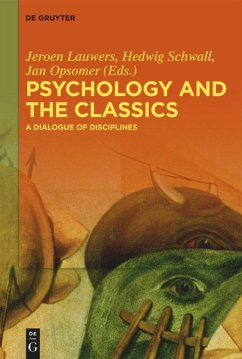While the field of classics has informed and influenced the early developments of the field of psychology, these two disciplines presently enjoy fewer fruitful cross-fertilizations than one would expect. This book shows how the study of classics can help psychologists anchor their scientific findings in a historical, literary and philosophical framework, while insights of contemporary psychology offer new hermeneutic methods and explanations to classicists.
This book is the first to date to offer a wide-ranging overview of the possibilities of marrying contemporary trends in psychology and classical studies. Advocating a critical dialogue between both disciplines, it offers novel reflections on psychotherapy, ancient philosophy, social psychology, literature and its theory, historiography, psychoanalysis, tragedy, the philosophy of mind, linguistics and reception. With twenty contributions by specialists in different fields, it promotes the combination of classical and psychological perspectives, and demonstrates the methods and rewards of such an endeavour through concrete case studies.
This pioneering book is thus intended for all readers who seek inspiration for their readings, research, or therapeutic practice.
This book is the first to date to offer a wide-ranging overview of the possibilities of marrying contemporary trends in psychology and classical studies. Advocating a critical dialogue between both disciplines, it offers novel reflections on psychotherapy, ancient philosophy, social psychology, literature and its theory, historiography, psychoanalysis, tragedy, the philosophy of mind, linguistics and reception. With twenty contributions by specialists in different fields, it promotes the combination of classical and psychological perspectives, and demonstrates the methods and rewards of such an endeavour through concrete case studies.
This pioneering book is thus intended for all readers who seek inspiration for their readings, research, or therapeutic practice.

